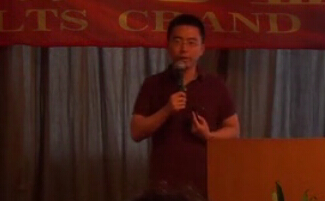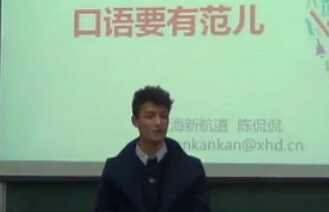莫言语录:饥饿和孤独是我创作的财富
2012-10-18 16:23 供稿单位: 互联网
出国英语考试有哪些 雅思6.5是什么水平 雅思阅读评分标准 托福阅读评分标准 雅思和托福的区别
饥饿和孤独是我创作的财富 Hunger and Loneliness: My Muses
每个作家都有他成为作家的理由,我自然也不能例外,但我为什么成了一个这样的作家,而没有成为像海明威、福克纳那样的作家,我想这与我独特的童年经历有关。我认为这是我的幸运,也是我在今后的岁月里还可以继续从事写作这个职业的理由。
Every person has his own reasons for becoming a writer, and I am no exception. But why I became the sort of writer I am and not another Hemingway or Faulkner is, I believe, linked to my childhood experiences. They have been a boon to my writing career and are what will make it possible for me to keep at it down the road.
从现在退回去大约四十年,也就是20世纪的60年代初期,正是中国近代历史上一个古怪而狂热的时期。那时候一方面是物质极度贫乏,人民吃不饱穿不暖,几乎可以说是在死亡线上挣扎;但另一方面却是人民有高度的政治热情,饥饿的人民勒紧腰带跟着共产党进行共产主义实验。那时候我们虽然饿得半死,但我们却认为自己是世界上最幸福的人,而世界上还有三分之二的人――包括美国人――都还生活在“水深火热”的苦难生活之中。而我们这些饿得半死的人还肩负着把你们从苦海里拯救出来的神圣责任。当然,到了八十年代,中国对外敞开了大门之后,我们才恍然大悟、如梦初醒。
Looking back some forty years ago, to the early 1960s, I revisit one of modern China’s most bizarre periods, an era of unprecedented fanaticism. On one hand, those years saw the country in the grips of economic stagnation and individual deprivation. The people struggled to keep death from their door, with little to eat and rags fro clothes; on the other hand, it was a time of intense political passions, when starving citizens tightens their belts and followed the Party in its Communist experiment. We may have been famished at the time, but we considered ourselves to be the luckiest people in the world. Two-thirds of the world’s people, we believed, were living in dire misery, and it was our sacred duty to rescue them from the sea of suffering in which they were drowning. It wasn’t until the 1980s, when China opened its door to the outside world, that we finally began to face reality, as if walking from a dream.
在我的童年时期,根本就不知道世界上还有照相这码事,知道了也照不起。所以我只能根据后来看到过的一些历史照片,再加上自己的回忆,来想像出自己的童年形象。我敢担保我想像出来的形象是真实的。
As a child, I knew nothing about photography, and even if I had I couldn’t have afforded to have my picture taken. So I am able to piece together am image of my childhood based solely upon historical photographs and my own collections, although I dare say the image I conjure up is real to me.
那时,我们这些五六岁的孩子,在春、夏、秋三个季节里,基本上是赤身裸体的,只是到了严寒的冬季,才胡乱地穿上一件衣服。那些衣服的破烂程度是今天的中国孩子想像不到的。我相信我奶奶经常教导我的一句话,她说人只有享不了的福,但是没有受不了的罪。我也相信达尔文的适者生存学说,人在险恶的环境里,也许会焕发出惊人的生命力。不能适应的都死掉了,能够活过来的,就是优良的品种。所以,我大概也是一个优良的品种。那时候我们都有惊人的抗寒能力,连浑身羽毛的小鸟都冻得唧唧乱叫时,我们光着屁股,也没有感到冷得受不了。我对当时的我充满了敬佩之情,那时我真的不简单,比现在的我许多倍。
Back then, five-or-six-year-olds like myself went virtually naked all through the spring, the summer, and the fall. We threw something over our backs only during the bitterly cold winters. Such tattered clothes are beyond the imagination of today’s children in China. My grandmother once told me that while there is no suffering a person cannot endure, there is plenty of good fortune one can never hope to enjoy. I believe that. I also believe in Darwin’s theory of the survival of the fittest. When some one is thrown into the most perilous circumstances, he may well display surprising vitality. Thos who can’t adapt die off, while those who survive are of the best stock. So I guess I can say I come from superior stock. During those times, we had an amazing ability to withstand cold. With our bottoms exposed, we didn’t feel that the cold was unbearable, even though feathered birds cried in the freezing weather. I have nothing but admiration for myself as a youngster; I was a force to be reckoned with then, a much finer specimen than I am now.
那时候我们这些孩子的思想非常单纯,每天想的就是食物和如何才能搞到食物。我们就像一群饥饿的小狗,在村子中的大街小巷里嗅来嗅去,寻找可以果腹的食物。许多在今天看来根本不能入口的东西,在当时却成了我们的美味。我们吃树上的叶子,树上的叶子吃光后,我们就吃树的皮,树皮吃光后,我们就啃树干。那时候我们村的树是地球上最倒霉的树,它们被我们啃得遍体鳞伤。那时候我们都练出了一口锋利的牙齿,世界上大概没有我们咬不动的东西。我的一个小伙伴后来当了电工,他的工具袋里既没有钳子也没有刀子,像铅笔那样粗的钢丝他毫不费力地就可以咬断,别的电工用刀子和钳子才能完成的工作,他用牙齿就可以完成了。那时我的牙齿也很好,但不如我那个当了电工的朋友的牙齿好,否则我很可能是一个的电工而不是一个作家。
(As kids), what run through our heads was simplicity itself: all we ever thought about was food and how to get it. We were like a pack if starving dogs, haunting the streets and lanes sniffing the air for something to put inside our bellies. Plenty of things no one would even consider putting into their mouths these days were treats for us then. We ate the leaves off trees, and once they were gone we turned our attention to the bark. After that, we gnawed on the trunks themselves. No trees in the world ever suffered as much as those in our village. But instead of wearing our teeth down, our peculiar diet made them as sharp and strong as knives. Nothing could stand up to them. One of my childhood friends became an electrician after he grew up. There were no pliers or knives in his tool kit; all he needed was his teeth to bite through wire as thick as a pencil— those were the tools of his trade. I had strong teeth too, but not as strong as my electrician friend’s. Otherwise, I might have become a first-rate electrician rather than a writer.
1961年的春天,我们村子里的小学校里拉来了一车亮晶晶的煤块,我们孤陋寡闻,不知道这是什么东西。一个聪明的孩子拿起一块煤,咯嘣咯嘣地吃起来,看他吃得香甜的样子,味道肯定很好,于是我们一拥而上,每人抢了一块煤,咯嘣咯嘣吃起来。我感到那煤块愈嚼愈香,味道的确是好极了。看到我们吃得香甜,村子里的大人们也扑上来吃,学校里的校长出来阻止,于是人们就开始哄抢。至于煤块吃到肚子里的感觉,我已经忘记了,但吃煤时口腔里的感觉和煤的味道,至今还牢记在心。不要以为那时候我们就没有欢乐,其实那时候我们仍有许多欢乐,我们为发现了一种可以食用的物品而欢欣鼓舞。
In the spring of 1961, a load of glistening coal was delivered to our elementary school. We were so out of touch we didn’t know what the stuff was. But one of the brightest kids picked up a piece, bit off a chunk, and started crunching away. The look of near rapture on his face meant it must have been delicious. So we rushed over, grabbed pieces of our own, and started crunching away. The more I ate, the better the stuff tasted, until it seemed absolutely delicious. Then some of the village adults who were looking on came up to see what we were eating with such gusto, and joined in. When the principal came out to put a stop to this feast, that only led to pushing and shoving. Just what the coal felt like down in my belly is something I can no longer recall, but I’ll never forget how it tasted. Don’t for a minute think there was no pleasure in our lives back then. We had fun doing lots of things. Topping the list of fun things to do was gleefully eating something we’d never considered food before.
这样的饥饿岁月大概延续了两年多,到了六十年代中期,我们的生活好了起来,虽然还是吃不饱,但每人每年可以分到两百斤粮食,再加上到田野里去挖一点野菜,基本上可以维持人的生命,饿死人的事愈来愈少了。
The famine lasted for a couple of years or more, until the mid-1960s, when life improved. We still didn’t have enough to eat, but every person was allotted about 200 pounds of grain per year; that combined with the wild greens we foraged in the fields was enough to get by on, and fewer people starved to death.
当然,仅仅有饥饿的体验,并不一定就能成为作家,但饥饿使我成为一个对生命的体验特别深刻的作家。长期的饥饿使我知道,食物对于人是多么的重要。什么光荣、事业、理想、爱情,都是吃饱肚子之后才有的事情。因为吃我曾经丧失过自尊,因为吃我曾经被人像狗一样地凌辱,因为吃我才发奋走上了创作之路。
Obviously, the experience of going hungry cannot, by itself, make a writer out of someone, but once I became a writer, I had a deeper understanding of life than most because of it. Prolonged hunger made me realize how very important food is to people. Glory, causes, careers, and love mean nothing on an empty stomach. Because of food, I lost my self-respect; because of food, I suffered the humiliation of a lowly cur; and because of food I took up creative writing, with a vengeance.
新航道国际教育集团提供专业的雅思培训、托福培训、GRE培训、SAT培训、剑桥青少英语培训等英语培训,帮助广大学子“用英语点亮人生”。
- 上一篇:莫言语录:您幸福吗?莫言:我不知道
- 下一篇:莫言语录:当作家最初了为吃三顿饺子

- 时时分享励志成长、英语学习、考试信息、留学动态等。《轻松学英文》致力于为广大英语学习爱好者提供青少英语、雅思、托福、SAT及留学规划等权威学习和资讯内容,力求帮助学生提高英语运用能力,在轻松快乐的环境中走向英语成功之道!
精彩专题
更多视频荟萃
更多
-
新航道姚骏鹏-雅思阅读高分攻略
时长:03-06

-
新航道陈侃侃-雅思口语要有范儿
时长:03-06

-
【3分钟学雅思】王大锤告诉你为啥药不能停
时长:01-12

-
【3分钟学雅思】全世界个感官餐厅
时长:01-12
热门文章
更多
-
8月31日雅思广州考机考初体验
选择机考模式的考生将通过机考模式参加听...









